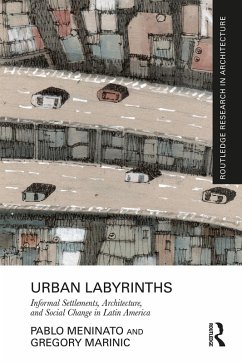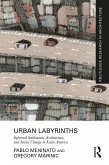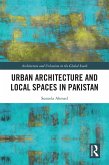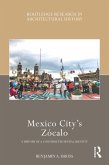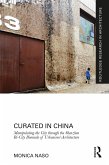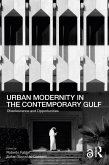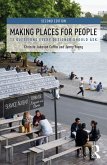Pablo Meninato, Gregory Marinic
Urban Labyrinths (eBook, ePUB)
Informal Settlements, Architecture, and Social Change in Latin America
41,95 €
41,95 €
inkl. MwSt.
Sofort per Download lieferbar

21 °P sammeln
41,95 €
Als Download kaufen

41,95 €
inkl. MwSt.
Sofort per Download lieferbar

21 °P sammeln
Jetzt verschenken
Alle Infos zum eBook verschenken
41,95 €
inkl. MwSt.
Sofort per Download lieferbar
Alle Infos zum eBook verschenken

21 °P sammeln
Pablo Meninato, Gregory Marinic
Urban Labyrinths (eBook, ePUB)
Informal Settlements, Architecture, and Social Change in Latin America
- Format: ePub
- Merkliste
- Auf die Merkliste
- Bewerten Bewerten
- Teilen
- Produkt teilen
- Produkterinnerung
- Produkterinnerung

Bitte loggen Sie sich zunächst in Ihr Kundenkonto ein oder registrieren Sie sich bei
bücher.de, um das eBook-Abo tolino select nutzen zu können.
Hier können Sie sich einloggen
Hier können Sie sich einloggen
Sie sind bereits eingeloggt. Klicken Sie auf 2. tolino select Abo, um fortzufahren.

Bitte loggen Sie sich zunächst in Ihr Kundenkonto ein oder registrieren Sie sich bei bücher.de, um das eBook-Abo tolino select nutzen zu können.
Urban Labyrinths: Informal Settlements, Architecture, and Social Change in Latin America is a coauthored book that examines intervention initiatives in informal settlements in Latin American cities as social, spatial, architectural, and cultural processes.
- Geräte: eReader
- mit Kopierschutz
- eBook Hilfe
Andere Kunden interessierten sich auch für
![Urban Labyrinths (eBook, PDF) Urban Labyrinths (eBook, PDF)]() Pablo MeninatoUrban Labyrinths (eBook, PDF)41,95 €
Pablo MeninatoUrban Labyrinths (eBook, PDF)41,95 €![Urban Architecture and Local Spaces in Pakistan (eBook, ePUB) Urban Architecture and Local Spaces in Pakistan (eBook, ePUB)]() Suneela AhmedUrban Architecture and Local Spaces in Pakistan (eBook, ePUB)41,95 €
Suneela AhmedUrban Architecture and Local Spaces in Pakistan (eBook, ePUB)41,95 €![Mexico City's Zócalo (eBook, ePUB) Mexico City's Zócalo (eBook, ePUB)]() Benjamin A. BrossMexico City's Zócalo (eBook, ePUB)43,95 €
Benjamin A. BrossMexico City's Zócalo (eBook, ePUB)43,95 €![Curated in China (eBook, ePUB) Curated in China (eBook, ePUB)]() Monica NasoCurated in China (eBook, ePUB)41,95 €
Monica NasoCurated in China (eBook, ePUB)41,95 €![Urban Modernity in the Contemporary Gulf (eBook, ePUB) Urban Modernity in the Contemporary Gulf (eBook, ePUB)]() Urban Modernity in the Contemporary Gulf (eBook, ePUB)0,00 €
Urban Modernity in the Contemporary Gulf (eBook, ePUB)0,00 €![Making Places for People (eBook, ePUB) Making Places for People (eBook, ePUB)]() Christie Johnson CoffinMaking Places for People (eBook, ePUB)40,95 €
Christie Johnson CoffinMaking Places for People (eBook, ePUB)40,95 €![Computational Design for Landscape Architects (eBook, ePUB) Computational Design for Landscape Architects (eBook, ePUB)]() Brendan HarmonComputational Design for Landscape Architects (eBook, ePUB)43,95 €
Brendan HarmonComputational Design for Landscape Architects (eBook, ePUB)43,95 €-
-
-
Urban Labyrinths: Informal Settlements, Architecture, and Social Change in Latin America is a coauthored book that examines intervention initiatives in informal settlements in Latin American cities as social, spatial, architectural, and cultural processes.
Dieser Download kann aus rechtlichen Gründen nur mit Rechnungsadresse in A, B, BG, CY, CZ, D, DK, EW, E, FIN, F, GR, HR, H, IRL, I, LT, L, LR, M, NL, PL, P, R, S, SLO, SK ausgeliefert werden.
Produktdetails
- Produktdetails
- Verlag: Taylor & Francis eBooks
- Seitenzahl: 232
- Erscheinungstermin: 29. März 2024
- Englisch
- ISBN-13: 9781003847250
- Artikelnr.: 69958152
- Verlag: Taylor & Francis eBooks
- Seitenzahl: 232
- Erscheinungstermin: 29. März 2024
- Englisch
- ISBN-13: 9781003847250
- Artikelnr.: 69958152
- Herstellerkennzeichnung Die Herstellerinformationen sind derzeit nicht verfügbar.
Pablo Meninato, PhD, is an architect, architectural critic, and educator. A native of Argentina, Meninato has practiced and taught architecture in Philadelphia, Buenos Aires, and Monterrey, Mexico. He is an Associate Professor at the Temple University Tyler School of Art and Architecture where he teaches history, theory, and urban design.
Gregory Marinic, PhD, is an Associate Professor at the University of Cincinnati College of Design, Architecture, Art, and Planning SAID and Director of URBANIA, a grant-funded research lab. His current field research is based in Mexico City, Buenos Aires, Lima, La Paz, and Guayaquil where it focuses on housing, urban design, informal settlements, and urban morphology.
Gregory Marinic, PhD, is an Associate Professor at the University of Cincinnati College of Design, Architecture, Art, and Planning SAID and Director of URBANIA, a grant-funded research lab. His current field research is based in Mexico City, Buenos Aires, Lima, La Paz, and Guayaquil where it focuses on housing, urban design, informal settlements, and urban morphology.
List of figuresForeword: Francesco M. OrsiniAcknowledgementsIntroduction
Migratory Waves Right to the City? Nomenclature Addressing Informality
Bibliographic Antecedents Structure of the Book Chapter 1. Rio De Janeiro
Slavery. Brazil's Enduring Legacy Towards a New Epistemology of Favelas The
Favela-Bairro Program Jorge Jáuregui. 'Everything had to be built' Favela
Intervention Tactics. Urbanism, Architecture, and Landscape Design A
Preemptive Balance of the Favela-Bairro Program Chapter 2. Medellín
PRIMED: Laying the Foundations Sergio Fajardo's Citizen Commitment EDU and
EPM: Redefining Governance Alejandro Echeverri and the Catalan Connection
PUI: Towards an Urban Design Strategy for Informal Neighborhoods Case
Study: PUI Nororiental Case Study: UVA de la Cordialidad Social Urbanism:
Critiques and RecommendationsChapter 3. São PauloA Distinctive Urban
History1980s, Brazil 'Discovering' FavelasThe Antonico Creek Project in
Favela ParaisópolisUpgrading Favelas in 'the Corner of Heaven'Devising
Favela-intervention MechanismsChapter 4. Buenos Aires The Persistence of
the Grid The Emergence of the 'Villas Miseria' and the Policies of
Eradication Social Sciences, Journalism, and the Visual Arts Acknowledging
the 'Villas Miseria' Urbanism Approximating Informality: Flavio Janches in
Villa Tranquila Villa 31. A Bit of history On Housing, Civic Buildings, and
Public Spaces Reasons for Optimism for a Fractured CountryChapter 5.
Tijuana When Illicitly Dictates Urban Growth A Laboratory of Postmodernity
On Paradises, Border Walls, and Canyons Los Laureles Canyon Oscar Romo,
Alter Terra and the Poetics of Recycling Cruz & Forman: Manufacturing
Informality Community Stations Integrating Formal and Informal Processes
Informality in Tijuana as a Differentiated PathChapter 6. Theoretical
Considerations Informal Cities Informality in Art Hélio Oiticica: Aspiring
to a Large Labyrinth The Esthetics of the Favela: Paola B
Migratory Waves Right to the City? Nomenclature Addressing Informality
Bibliographic Antecedents Structure of the Book Chapter 1. Rio De Janeiro
Slavery. Brazil's Enduring Legacy Towards a New Epistemology of Favelas The
Favela-Bairro Program Jorge Jáuregui. 'Everything had to be built' Favela
Intervention Tactics. Urbanism, Architecture, and Landscape Design A
Preemptive Balance of the Favela-Bairro Program Chapter 2. Medellín
PRIMED: Laying the Foundations Sergio Fajardo's Citizen Commitment EDU and
EPM: Redefining Governance Alejandro Echeverri and the Catalan Connection
PUI: Towards an Urban Design Strategy for Informal Neighborhoods Case
Study: PUI Nororiental Case Study: UVA de la Cordialidad Social Urbanism:
Critiques and RecommendationsChapter 3. São PauloA Distinctive Urban
History1980s, Brazil 'Discovering' FavelasThe Antonico Creek Project in
Favela ParaisópolisUpgrading Favelas in 'the Corner of Heaven'Devising
Favela-intervention MechanismsChapter 4. Buenos Aires The Persistence of
the Grid The Emergence of the 'Villas Miseria' and the Policies of
Eradication Social Sciences, Journalism, and the Visual Arts Acknowledging
the 'Villas Miseria' Urbanism Approximating Informality: Flavio Janches in
Villa Tranquila Villa 31. A Bit of history On Housing, Civic Buildings, and
Public Spaces Reasons for Optimism for a Fractured CountryChapter 5.
Tijuana When Illicitly Dictates Urban Growth A Laboratory of Postmodernity
On Paradises, Border Walls, and Canyons Los Laureles Canyon Oscar Romo,
Alter Terra and the Poetics of Recycling Cruz & Forman: Manufacturing
Informality Community Stations Integrating Formal and Informal Processes
Informality in Tijuana as a Differentiated PathChapter 6. Theoretical
Considerations Informal Cities Informality in Art Hélio Oiticica: Aspiring
to a Large Labyrinth The Esthetics of the Favela: Paola B
List of figuresForeword: Francesco M. OrsiniAcknowledgementsIntroduction
Migratory Waves Right to the City? Nomenclature Addressing Informality
Bibliographic Antecedents Structure of the Book Chapter 1. Rio De Janeiro
Slavery. Brazil's Enduring Legacy Towards a New Epistemology of Favelas The
Favela-Bairro Program Jorge Jáuregui. 'Everything had to be built' Favela
Intervention Tactics. Urbanism, Architecture, and Landscape Design A
Preemptive Balance of the Favela-Bairro Program Chapter 2. Medellín
PRIMED: Laying the Foundations Sergio Fajardo's Citizen Commitment EDU and
EPM: Redefining Governance Alejandro Echeverri and the Catalan Connection
PUI: Towards an Urban Design Strategy for Informal Neighborhoods Case
Study: PUI Nororiental Case Study: UVA de la Cordialidad Social Urbanism:
Critiques and RecommendationsChapter 3. São PauloA Distinctive Urban
History1980s, Brazil 'Discovering' FavelasThe Antonico Creek Project in
Favela ParaisópolisUpgrading Favelas in 'the Corner of Heaven'Devising
Favela-intervention MechanismsChapter 4. Buenos Aires The Persistence of
the Grid The Emergence of the 'Villas Miseria' and the Policies of
Eradication Social Sciences, Journalism, and the Visual Arts Acknowledging
the 'Villas Miseria' Urbanism Approximating Informality: Flavio Janches in
Villa Tranquila Villa 31. A Bit of history On Housing, Civic Buildings, and
Public Spaces Reasons for Optimism for a Fractured CountryChapter 5.
Tijuana When Illicitly Dictates Urban Growth A Laboratory of Postmodernity
On Paradises, Border Walls, and Canyons Los Laureles Canyon Oscar Romo,
Alter Terra and the Poetics of Recycling Cruz & Forman: Manufacturing
Informality Community Stations Integrating Formal and Informal Processes
Informality in Tijuana as a Differentiated PathChapter 6. Theoretical
Considerations Informal Cities Informality in Art Hélio Oiticica: Aspiring
to a Large Labyrinth The Esthetics of the Favela: Paola B
Migratory Waves Right to the City? Nomenclature Addressing Informality
Bibliographic Antecedents Structure of the Book Chapter 1. Rio De Janeiro
Slavery. Brazil's Enduring Legacy Towards a New Epistemology of Favelas The
Favela-Bairro Program Jorge Jáuregui. 'Everything had to be built' Favela
Intervention Tactics. Urbanism, Architecture, and Landscape Design A
Preemptive Balance of the Favela-Bairro Program Chapter 2. Medellín
PRIMED: Laying the Foundations Sergio Fajardo's Citizen Commitment EDU and
EPM: Redefining Governance Alejandro Echeverri and the Catalan Connection
PUI: Towards an Urban Design Strategy for Informal Neighborhoods Case
Study: PUI Nororiental Case Study: UVA de la Cordialidad Social Urbanism:
Critiques and RecommendationsChapter 3. São PauloA Distinctive Urban
History1980s, Brazil 'Discovering' FavelasThe Antonico Creek Project in
Favela ParaisópolisUpgrading Favelas in 'the Corner of Heaven'Devising
Favela-intervention MechanismsChapter 4. Buenos Aires The Persistence of
the Grid The Emergence of the 'Villas Miseria' and the Policies of
Eradication Social Sciences, Journalism, and the Visual Arts Acknowledging
the 'Villas Miseria' Urbanism Approximating Informality: Flavio Janches in
Villa Tranquila Villa 31. A Bit of history On Housing, Civic Buildings, and
Public Spaces Reasons for Optimism for a Fractured CountryChapter 5.
Tijuana When Illicitly Dictates Urban Growth A Laboratory of Postmodernity
On Paradises, Border Walls, and Canyons Los Laureles Canyon Oscar Romo,
Alter Terra and the Poetics of Recycling Cruz & Forman: Manufacturing
Informality Community Stations Integrating Formal and Informal Processes
Informality in Tijuana as a Differentiated PathChapter 6. Theoretical
Considerations Informal Cities Informality in Art Hélio Oiticica: Aspiring
to a Large Labyrinth The Esthetics of the Favela: Paola B
